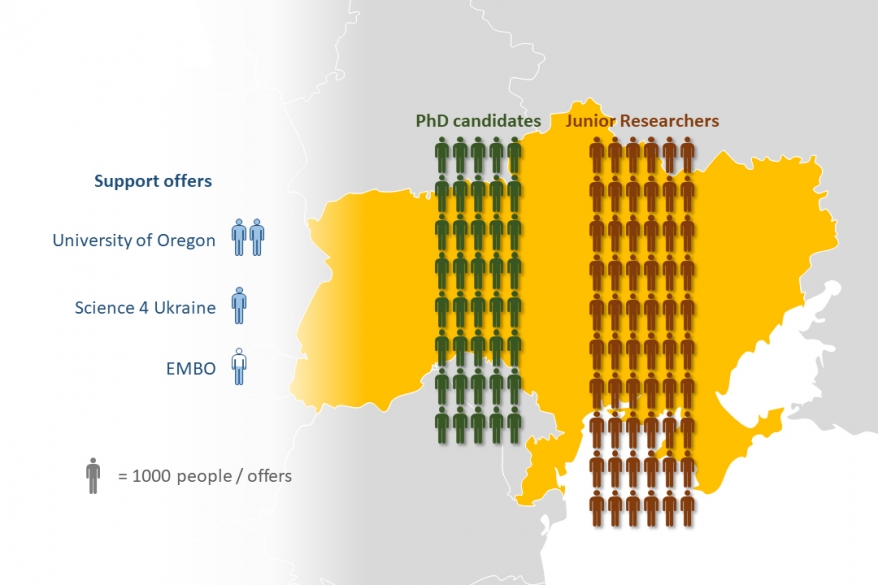N.B.: Comprehensive List of Support Offers for Ukrainian Researchers
Eurodoc fully condemns Russia’s military aggression as well as Russia’s and Belarus’ infringement on basic human rights of the people in Ukraine as well as their own people. As a grassroots federation of 29 national associations of early-career researchers (ECRs) from 26 countries across Europe, Eurodoc has been following the offers for help and support extended to researchers, students, and staff from Ukrainian universities closely and we appreciate the concrete measures for support that are being put in place by universities and research institutions.
In order to get a better understanding of the actual needs for support by researchers from Ukraine, Eurodoc has evaluated the limited data available in the absence of any government or OECD data. Drawing on the numbers provided by Zhilyaev et al. (2015), the Ministry of Education and Science (2019), and THE, we estimate that Ukraine currently has close to 40,000 PhD candidates and 60,000 junior researchers in addition to ca. 250,000 Bachelor and Master students, not accounting for other research staff. In contrast, the most comprehensive list of support offers currently (20.3.2022) specifies only ca. 2,000 offered positions. So far, the uptake of these offers has been limited. The Ukrainian Young Scientists Council (RMU) has informed us that they typically mediate some 2,500 students’ applications per day, whereas PhD candidates’ and junior researchers’ applications handled by RMU amount to ca. 10 per day. Reasons for this include restrictions to leave the country, the decision to stay and help other victims of the war, or a lacking command of the English language.
In light of these observations, Eurodoc recommends research institutions and national authorities to consider the following points:
- Analysing the offers listed by Science for Ukraine as well as on this spreadsheet, the majority of places offered are in STEM disciplines with few in the social sciences and the humanities. However, there are significantly more researchers in the humanities and social sciences than in STEM in Ukraine.
- Many will need a few days to reorient themselves after having fled the country. Hence, we urge research institutions to be mindful of this when setting deadlines, e.g. on applications.
- Both Ukrainian society as well as academia are very diverse, not everyone fleeing the war will have Ukrainian citizenship. In particular, Ukraine was a popular host for students from Africa and India. Please ensure that also students and academics with foreign passports find safe passage and admission as refugees.
- Many researchers and students will not want to or cannot currently leave Ukraine. In particular, there are border crossing restrictions in place for men between the ages of 18 and 60. It is, thus, essential to provide and plan for support measures for researchers and students who remain in Ukraine (e.g. support with/replacement of damaged infrastructure, equipment, lab materials; remote collaboration possibilities; grants for remote work; remote access to computational resources, libraries, databases etc.) or who may only be displaced at a later time during this year.

